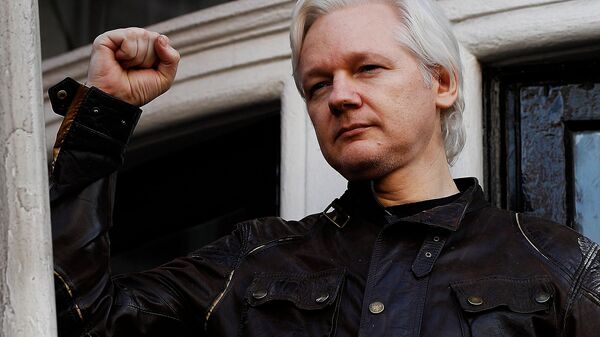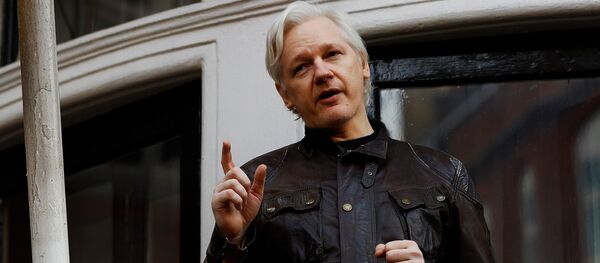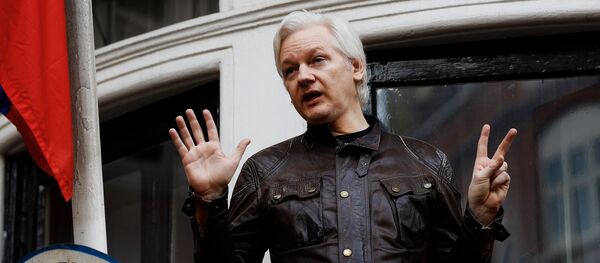Assange, who has been residing inside the embassy since 2012, could either be forced out of the embassy or make the decision to willingly leave over restrictions placed on him, the New York Post reported.
A slew of troubling situations would start to trickle in for the 46-year-old if he's forced out, activist and comedian Randy Credico told Radio Sputnik's Loud & Clear.
"The situation is very fluid right now and the word is that Mr Assange could be expelled from that embassy," Credico told show hosts John Kiriakou and Walter Smolarek, which means "he would immediately be arrested on an old bail jumping charge by the British police."
He'll probably then be extradited to the US, Credico said.
The bail jumping charge that Credico is referring to is related to an international arrest warrant for Assange issued by Sweden in November 2010 over allegations of sexual assault. Though Assange repeatedly denied the accusations, he eventually surrendered himself to UK officials in December and was held for some 10 days before being released on bail.
However, after being unable to successfully challenge extradition proceedings, Assange breached his bail when he sought asylum from the Ecuadorean embassy. Although Sweden later dropped its charges and revoked the arrest warrant, it was determined in February 2018 by Senior District Judge Emma Arbuthnot that the UK bail jumping charge would not be withdrawn, as he did commit the offense.
If booted from the Ecuadorean embassy, extradition procedures would likely be started by British officials to ship Assange to the US to answer for a series of leaks, including of US war logs on Afghanistan and Iraq and the Collateral Murder video that was provided to WikiLeaks by Chelsea Manning in 2010.
According to Credico, the decision to keep the arrest warrant valid was more to prevent him from digging up any more dirt on foreign governments, even as he was granted asylum at the embassy and later Ecuadorean citizenship.
"[The British government] really wanted him in there and then they really wanted him quiet the last couple of months," the activist told Kiriakou. "The timing with the Skripal case in Salisbury and the Syrian gas and all of that — [Assange] was starting to talk about that on top of Catalan [independence] — but I think the Brits, when King Salman [of Saudi Arabia] went to the US, France and then Britain — you knew something was coming, and he'd probably sniff it out and talk about that."
"They don't want him talking about it. He's a journalist, they want to keep him quiet — they don't want their crimes to be exposed," Credico stressed.
When Smolarek mentioned the chilling effect charging Assange with espionage could have on the world of journalism, Credico remarked that such a charge would be ridiculous as Ecuador's constitution states in Article 79 that "in no case shall extradition of an Ecuadorean be granted," and Assange is now an Ecuadorean.
"How could he be charged with espionage? He's not a US citizen," Credico said.
"The whole thing smells and they want to quiet Julian Assange since he represents a danger. What's really frustrating is that you don't have the mainstream media supporting him en masse, which is what they should be doing… because if he goes… that sets a very dangerous precedent and [the media] should be standing and circling the wagons," he added.
"You don't muzzle dissent, you don't muzzle the First Amendment, no matter how much it is perverted," he told Smolarek.
Credico also revealed Friday that he met Rep. Adam Schiff (D-CA), the top Democrat on the House Intelligence Committee guiding Russiagate investigations, this week with the hopes of arranging a one-on-one meeting with Assange. Russiagate proponents accuse Assange of being part of a Russia-backed plot to purposely publish thousands of emails allegedly stolen by Russian hackers from the Democratic National Committee and Hillary Clinton's presidential campaign. Assange and WikiLeaks maintain that the email trove did not come from Russia.




